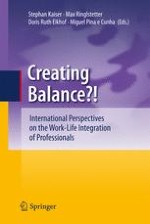2011 | OriginalPaper | Buchkapitel
4. Redefining Success: The Foundation for Creating Work-Life Balance
verfasst von : J. Lee Whittington, Rosemary Maellaro, Timothy Galpin
Erschienen in: Creating Balance?
Verlag: Springer Berlin Heidelberg
Aktivieren Sie unsere intelligente Suche, um passende Fachinhalte oder Patente zu finden.
Wählen Sie Textabschnitte aus um mit Künstlicher Intelligenz passenden Patente zu finden. powered by
Markieren Sie Textabschnitte, um KI-gestützt weitere passende Inhalte zu finden. powered by
